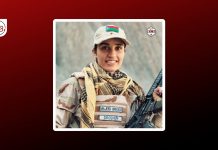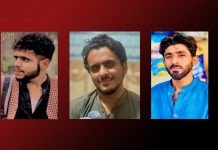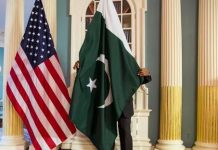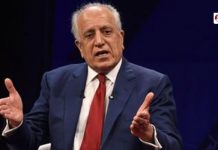Author: Burz Kohi; Translation by Dur Bibi
Note: In the heart of the struggle, Operation Herof becomes a symbol of resistance and sacrifice. The narrative of Burz Kohi intertwines with the valor and tenacity of those who took part in this historic mission. The account of Herof is not just a chronicle of events but a reflection of the relentless spirit of those who dared to challenge the status quo, embodying the essence of courage and commitment in the quest for freedom.
Article:
The act of sacrificing oneself for the unparalleled and unique achievement of a nation’s dignity and freedom transcends the ineffective focus on individualism. Instead, it touches on the fundamental sense of collective philosophy, enveloping itself in the colours of eternal survival. It is an act that breaks through the rusted, locked doors of existentialism, human life, survival, and identity, thereby claiming the crown of true life. By offering the firm and enduring example of sacrifice, which wipes away the outdated and decayed discourse of slavery, the sons born from the womb of the earth dismantle all imaginative and traditional dogmas of life and death through their actions, creating a new concept and philosophy that becomes the crown jewel of history. Indeed, if Sartre was alive today, he would be filled with both astonishment and joy at the practical manifestation of his existential philosophy. The selfless sons and daughters of the homeland, nourished by the fundamental thought and philosophy of survival and identity, free of the dilemma and confusion standing in the way of collective pride and success, are becoming eternally enshrined in the pages of history with golden letters. The story of the martyrs of Operation ‘Herof’ (Black Storm) revolves around these very points, gifting national and collective thought and wisdom with a precious gift: to perish for the survival of collective identity and to touch the eternal soul of survival after perishing, is the true essence of life.
When the shadows of evening, blending in hues of red and pink, unfold their wings along the shores of Gwadar, no living soul can resist the spiritual and magical allure of this breathtaking sight. The free birds above the coast appear as if a painter has sprinkled colours across the canvas of the sky to enhance his masterpiece. The waves, as they flow, bestow rhythm and melody upon the silent soul of stillness, conversing with one another. Softly placing her delicate feet on the wet sand, Mahal, with eyes like those of a gazelle, filled with storms and oceans of dreams, and with boundless love for her homeland, sits by the shore. Holding Maxim Gorky’s book “Mother” in her hands, she contemplates and understands the unique and invaluable struggle of the main character, Pavel Vlasov’s mother.
As she gazes toward the sea with her gazelle-like eyes, a boat appears in the distance, slowly approaching the shore. The eyes of the Baloch fisherman aboard the boat are filled with sadness, his tongue singing the traditional fisherman’s song, “Amba”. Mahal, embodying courage and touching the spirit of awareness, stands up, thinking of bringing transformation to the course of history, and sets off in search of the essence of life, with thoughts of sacrifice deep in her heart, Mahal quietly embarks on her journey.
Mahal, embodying courage and carrying storms in her eyes, joined the Baloch Liberation Army (BLA) two years ago. A year later, to keep collective survival and identity alive, she voluntarily offered her services to the Majeed Brigade. In secrecy and silence, she sharpened her awareness like a dagger, awaiting her mission.
One day, when she is approached to carry out the mission, she tells the operational command, aiming to write a new chapter in Baloch resistance history: “My wish is not to go alone on my final mission, but rather to walk alongside my comrades as I fulfill it. I believe we have the ability to shatter the enemy’s pride, dignity, morale, and strength by standing shoulder to shoulder with our comrades.”
To grasp these words, brimming with consciousness and free from superficiality, one need not look into a theoretical framework. Instead, examining the psychology and collective mindset of the Baloch nation in a historical context reveals the truth. The thoughts of Bibi Banadi, Gul Bibi, and Mahi Bebo are deeply embedded in the minds of the daughters of Balochistan, and no force can stop them. The heirs of Hammal Jiyand’s soil fight against colonial powers, sacrificing themselves for the freedom and honour of their homeland. Mahal’s words infuse new energy, a reconstruction, and a new path into the resistance movement. However, to bring words into action, one must reach the highest level of awareness and deeply understand the purpose. To break traditional opinions, open the rusted doors of the battlefield, rebuild the pillars of the movement, and keep strategic innovation in view, Mahal expresses her desire to carry out the mission of Operation Herof alongside her comrades and successfully fulfils her national duty.
Her passion for history and the movement, her awareness of the need for change in the national struggle, and her desire to avoid an identity crisis in history was evident in her thoughts. When it came time to choose a codename, she chose “Zilan,” after Zeynep Kinaci, known as Zilan Kurd, a fighter of the Kurdistan Workers’ Party (PKK) who fought for the freedom of Kurdistan. Zeynep Kinaci is recognised as a symbol of resistance among the oppressed and subjugated nations, including the Kurdish freedom struggle. Zilan Kurd became immortal after carrying out a fidayeen attack against Turkish soldiers on June 30, 1996, for the freedom of the Kurdish people.
Familiar with the symbol of Kurdish resistance, Mahal chooses the name “Zilan Kurd” to introduce the Baloch national struggle to other freedom-loving nations around the world, particularly the Kurdish people. When asked why she chose this alias, she said: “I want to send a message to the fighters connected to Kurdistan’s struggle for freedom that we, too, are a brave and fearless nation, engaged in battle against the enemy for our freedom. Through my actions, I want to make them aware of the Baloch national movement.”
These words reveal her intelligence, knowledge, awareness, and insight. However, when words are not woven into the thread of action, they bring nothing but self-satisfaction and do not illuminate the collective mindset or the battlefield. The famous Brazilian educator Paulo Freire, in his book “Pedagogy of the Oppressed”, also emphasises the need to connect words and dialogue with praxis (action). According to him, revolution cannot be achieved unless the words spoken are linked with investigation and action.
Mahal understands this truth and embraces the path of sacrifice, becoming immortal forever.
The psychology of the Baloch nation revolves around the axis of war. This is primarily due to the events in Baloch national history, where the sons of the homeland have always been ready to fight against the coloniser. Another aspect is the transcendence of gender division. During the 15th-century campaign against Delhi, Chakar Khan Rind’s sister, Banadi, marched alongside the army and bravely fought the opposition forces. However, later on, from British officers like Sandeman to Punjabi settlers, colonial discourse affected Baloch’s national identity, collective psychology, culture, and norms through religious schooling and the banking system of education.
According to Frantz Fanon, the coloniser uses the education system as a “trap house” to keep the oppressed people’s sons and daughters disconnected from their true identity and psychology. Regarding religion, the renowned Kenyan writer Ngũgĩ wa Thiong’o states that the coloniser uses religion as a weapon to distort the fundamental thought and philosophy of the oppressed people in order to stabilise their colonial regime and fulfil their exploitative ambitions.
However, the youth associated with the Baloch resistance movement are equipped with the weapon of awareness and are thwarting the enemy’s plans. Mahal, a courageous Baloch daughter emerging from these very institutions, rejects the gifts bestowed by colonial discourse and follows in the footsteps of Banadi, Gul Bibi, and Shari. She proves that to bring new construction, and reforms, and to decolonize the Baloch nation, sacrifice is a national duty and obligation.
On the evening of August 25’2024, 800 brave sons from the Special Tactical Operation Squad (STOS) and Fateh Squad, equipped with modern combat skills and strategic plans, march toward various targets in 44 locations across 13 districts of Balochistan. Armed with modern weapons, these fearless and determined warriors of the homeland launch coordinated attacks on enemy strategic installations, headquarters, outposts, vehicles transporting minerals, enemy personnel, and paramilitary stations and posts. They set up roadblocks, eliminating enemy intelligence operatives. While these simultaneous attacks, blockades, and strategic operations are taking place, the atmosphere in Bela remains silently engulfed in deep quietude. The people, animals, and birds, residing in their homes and nests, seek rest, preparing for a new day filled with hunger, accidents, humiliation, and the disgrace of slavery.
Suddenly, the silence is shattered by a massive explosion. The deafening sound of blasts and gunfire stuns the enemy soldiers, bringing them to the ground. Fidayee Mahal, driving a vehicle loaded with 600 kilograms of explosives, crashes into the enemy camp in Bela. She becomes immortal, forever merging with the earth and air like an eternal fragrance. Just minutes later, Fidayee Rizwan, from another direction, drives a vehicle filled with 400 kilograms of explosives into the enemy camp, securing an eternal place in history with golden letters and ensuring his everlasting identity.
The bewildered enemy is unable to take up defensive positions before five more fidayeen enter the camp from another direction and launch fierce attacks. They seize control of a section of the camp.
Before the attack on the Bela camp, the warriors, who had come to understand the true meaning of life and death, engage in conversation with one another. Fidayee Mohand Baloch, known by his alias Mirak, a prince emerging from the beautiful landscapes of Panjgur, the fragrant breezes of Paroom, the colourful fertile soil of Chetkan, and the embrace of unique mountains, says to Mahal:
“Comrade, you will achieve martyrdom before us. As soon as you reach our martyred companions, tell them that we, following in your footsteps, will soon strike a heavy blow against the enemy and join you in an embrace. Begin preparations for our welcome and celebration.”
During the preparations for Operation Herof, despite enduring a long journey, including a five-hour track on foot and only five hours of rest in two days, Fidayee Mahal, with deep awareness and eyes resembling a doe’s—holding both the stormy winds and the cool, captivating waves of love for the land and the nation—says to Fidayee Mirak with a smile on her lips and a glow of happiness on her face, “Just pray, comrade, that no innocent person is martyred because of my actions.”
These words, weighed on the scale of consciousness, reflect Fidayee Mahal’s knowledge, wisdom, and thoughtfulness. Her words bring to mind a saying by Ruk un uddin Bebras: “A true warrior does not fight because he hates the people in front of him, but because he loves the people standing behind him.”
For the occupier’s narrative and the so-called analysts and intellectuals lacking awareness, Mahal’s words were a stormy message wrapped in silence—a message of love, peace, freedom, and the Baloch nation’s identity and dignity.
The fidayeen, standing like strong and steadfast mountains in the face of all the pain, hardships, challenges, and tribulations encountered during the struggle for national freedom, embark on their journey. With the burning sting of oppression in their eyes and hatred for the occupiers in their hearts, they reach the limits of endurance, immersing themselves in the preparations for a difficult and long mission.
During the preparations, as Fidayee Asif Nechari, alias Naveed, and Fidayee Muhammad Bakhsh Sumalani, alias Khalid, move towards their target in Mastung, they get surrounded by enemy forces and, fighting bravely, achieve martyrdom. Losing comrades before the mission’s completion, comrades who were involved in formulating advanced strategies to confront the enemy during the operation, is an incredibly painful experience. Their sudden loss ignites a fire of grief in the hearts of those left behind. However, when the spark of consciousness rises wave after wave in the deep sea of the heart, it opens the door to action. Action becomes the eternal solution to all suffering and challenges, motivating the sons and daughters of the homeland to remain steadfast in their pursuit of the cause’s success.
With this in mind, and fully aware of the significance of the cause and the painful events that occur during wartime, Fidayee Mahal, with grace and courage, says to Fidayee Ghaus Bakhsh Sumalani, alias Talib, the elder brother of the martyred Fidayee Muhammad Bakhsh Sumalani: “We are in a state of war, and such events are bound to happen in war. We must not lose hope but instead focus on the mission tied to our cause.”
Upon hearing these words, Fidayee Ghaus Bakhsh Sumalani, internalising the sacrifice of his brother Muhammad Bakhsh Sumalani and comrade Asif, responds: “Comrade, with courageous souls like you standing beside us, the question of losing hope or courage doesn’t even arise.”
These words symbolise the promise of a bright future. They reflect resilience, bravery, sacrifice, and the unique colours of the organisational and national cause. These words are etched on the canvas of action, which no force in the world can erase.
The story of the brave fidayeen involved in Operation Herof reflects a unique and priceless sacrifice. Meshdar Sumalani, who joined the organisation for the defence of his homeland, attains martyrdom during a confrontation. However, the chapter of the struggle for the homeland’s freedom does not end there. The sacrifice of Shaheed Meshdar Sumalani becomes an inevitable force of thought, inspiring his two sons, Fidayee Ghaus Bakhsh Sumalani, alias Talib, and Fidayee Muhammad Bakhsh Sumalani, alias Khalid, to follow in their father’s footsteps and lay down their lives for the honour of the Baloch nation. This continuation of national consciousness and thought envelops both brothers, driving them to the ultimate limits in pursuit of their cause.
After offering their services to the Majeed Brigade, both brothers express a deep desire to complete their final mission together during the preparations for Operation Herof. They wish to be martyred side by side for their homeland, adding a timeless chapter of sacrifice to the annals of history. They present their intention to the operational command of the Majeed Brigade, stating, “We want to convey to all the sons of the land that the act of sacrificing for freedom is limitless. To achieve this goal, everyone—father, son, brother, sister—must contribute their part. This great cause demands equal sacrifice from everyone.”
Before the mission’s completion, Fidayee Khalid Sumalani physically parts from his comrades. However, rather than weakening, this event strengthens and solidifies Fidayee Talib Sumalani’s courage. Following in the footsteps of his father, Shaheed Meshdar Sumalani, and his brother, Shaheed Fidayee Muhammad Bakhsh Sumalani, Talib becomes immortal and writes a new chapter in the story of sacrifice in the pages of history.
John Foster Dulles states that lasting peace in the world is not possible until people implement their best capabilities. Peace, like war, demands ideology, sacrifice, and a genuine, dynamic faith. The practical illustration of these words can be found in the timeless story of the sacrifice of Fidayee Sangat Tayyib, alias Lala, from the land of resistance, Nushki. Confronted by the degradation of slavery, the humiliation inflicted by enemy forces, raids, arrests, mutilated bodies, and bloody intentions, he leaves his job with the Frontier Corps and heads abroad. However, the memories of the violent activities of the enemy forces in occupied Balochistan and his love for the land leave deep imprints on his mind. Abandoning a life of luxury, Fidayee Tayyib joins the BLA in 2022 and heads for the mountains. A year later, he joins the Majeed Brigade and mentally prepares himself for his final mission with patience and perseverance. During the preparations for Operation Herof, he reflects on past events, stating, “The collective humiliation, piles of mutilated bodies, kidnappings, operations, and the subjugation were unbearable for me. Even after leaving the Pakistani army, these events did not allow me to enjoy comfort and luxury abroad. That’s why I decided to become part of the war, to shatter these painful memories through my actions, and to serve my motherland.”
By contributing significantly to saving collective identity, raising the national flag high, and ensuring victory, Tayyib has permanently etched a story from which future generations will benefit.
On one side, Mahal launches the war with a decisive blow against the enemy, while Fidayee Rizwan, alias Hammal, who is entwined with the cause, springs into action. Each of his steps is a silent vow, and every breath is an unbreakable promise to his land. He knows that the enemy’s eyes are sharp, and the path ahead is fraught with danger, yet he advances with impatience. His body no longer belongs to him alone; it becomes a weapon in the cause of determination. With every heartbeat, he dedicates himself to this mission, and on the other side of the enemy camp, an explosion occurs, making Rizwan a fleeting ember in the storm of oppression, becoming a beacon to light the way for those who follow.
The martyrs of the land, including Sher Khan Zehri and our marksman (sniper specialist) Zia, alias Diljan, are invaluable gems of Zehri, while Fidayee Hafiz Zeeshan’s cousins, Fidayee Junaid Zehri, alias Kami, and Fidayee Fazal Gul Zehri, alias Shahvez, are also part of the operation Herof Fidayeen caravan.
In their shared birthplace, Zehri, two sons of the same soil, Kami and Shahvez, embark on a journey from which they know they will never return. Bound by blood and driven by a love for the land whose heartbeat echoes within them, they become kindred spirits on a final mission. As the dark clouds of war gather, their courage shines like twin stars, steadfast against the abyss. Shoulder to shoulder, they confront the enemy and offer their lives as a promise of peace and freedom for those they leave behind. Their sacrifice is not a scream but a whisper, forever heard in the rustling winds of their ancestral village, Zehri, Balochistan.
During a blockade in the area of Kadd Koocha in Mastung, the Fateh Squad fighter Sangat Shafqat achieves the rank of martyr while defending the homeland. Having served in numerous battles, Shaukat, a warrior who forsook all personal desires for the sake of his homeland’s flourishing fields, captivating mountains, valleys, forests, and deserts, and most importantly, for the people of his land, exemplifies eternal sacrifice. Today, the soil of Nag proudly reflects his legacy, and the air in Washok carries the fragrance of honour; the strong and steadfast mountains of Naagaho converse with the stars in memory of their warrior. Springs and rivers break their silence to recount sweet stories of Shafqat’s smiles, and trees dance with the wind, feeling the presence of their son’s essence in their shadows. Indeed, the tales of bravery, endurance, sacrifice, and courage of the Baloch people will serve as a guiding light for the oppressed and marginalised nations in the pages of history.
After seizing control of the Bela camp for a continuous 20 hours and killing 68 enemy soldiers, the brave fighters achieve eternal glory. Following 12 hours of blockades on various highways and roads in Balochistan, the elite unit of the Fateh Squad and the Special Tactical Operations Squad (STOS) proceed to safe locations after successful attacks on enemy personnel, secret operatives, strategic installations, and allied police and Levies stations. With a total of 130 enemy soldiers killed, Operation Herof comes to an end. However, this operation adds a golden chapter to the Baloch national movement, heralding a new phase filled with hope and optimism. This phase of regaining control over Balochistan exemplifies the intensity and innovation of the upcoming stages.
The intensity of war may lead to increased martyrdom, but it also brings the Baloch nation closer to the goal of freedom, making prosperity and contentment possible. While it is possible to resist the enemy slowly, such a prolonged approach pushes the goal further away. Robert Taber, in his book “War of the Flea”, describes this point by stating that the intensity of war represents the first phase towards conventional warfare, where the opposing side is left with no option but to take a defensive position. When the opposing side adopts a defensive stance, guerrilla fighters equipped with modern warfare skills and strategies come closer to their objectives. With public support and cooperation, they dominate the enemy’s psychology. Thus, guerrilla fighters benefit from the fruits of victory: the final phase of war relies on the strength of morale and psychology, where the weakening of one side’s morale ensures the success of the other.
Operation Herof is a paradigm of modern military skills, strategies, and offensive campaigns, unmatched in the contemporary Baloch resistance movement. Strict discipline, coordination, strategic planning, and decisive actions provide a priceless glimpse of organisational strength. According to Sun Tzu, wars are won not by weapons, but by effective strategies, disciplined command, timely decisions, precise attacks, and secrecy. When delivering a decisive blow to the enemy, attack where the enemy least expects it. Expanding on this, Robert Taber writes that in guerrilla warfare, when the opposing side has a power advantage, effective management, leadership with awareness, adaptability, and skill ensure ultimate success. Operation Herof is a practical manifestation of these principles, marking a new phase in the current freedom movement.
Operation Herof is not an end but a beginning, marking the start of a severe phase. It showcases a glimpse of effective power against the enemy—a demonstration of innovation and intensity that will erode the morale of the occupying forces by gripping the thread of continuity. Behind this storm lies a flood of fire and flames, ready to overturn the occupying forces and their imperial ambitions, ensuring the prominence of national identity and survival. For the occupiers and their exploitative allies, the doors of escape remain open. If they persist in their aims and escalate the violence, the defenders of the homeland, equipped with collective thought and modern military skills, will be ready to strike decisively. They will herald a new dawn, turning the dark night of occupation into a tale of the past, fighting to secure a unique place in the annals of history until the very end. Certainly, ultimate success will be ours.
A few hours before Operation Herof begins, all the fidayeen sitting together, chatting and answering the question posed by Fidayee Junaid Zehri: “What does life mean to you?” Finally, Fidayee Mahal Baloch says, “Life before this wasn’t life; my life is about to begin today.” After a brief pause, Mahal adds, “I want my last meal to be my favourite biryani, which I will make myself and serve to all my fidayeen comrades.” She then smiles, stands up to start preparing the biryani, and all the fidayeen assist her in cooking. They laugh and chat as they enjoy Mahal’s biryani, and then proceed to make preparations for their mission.
Disclaimer: The views and opinions expressed in this article are those of the author and do not necessarily reflect the official policy or position of The Balochistan Post or any of its editors.




























